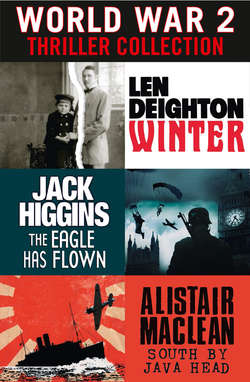Читать книгу World War 2 Thriller Collection: Winter, The Eagle Has Flown, South by Java Head - Jack Higgins, Justin Richards - Страница 34
Оглавление1927
‘That’s all they ask in return’
It was late May, a time when all Berlin is filled with the smell of linden flowers. The sun came spasmodically from behind ragged grey clouds, but it was not warm. Pauli sat outside to drink his tea and spend a few minutes watching the world pass by.
Pauli’s face was known in all the most fashionable cafés in Berlin: the Monopol, the Josty, the Schiller, the Café des Westens. But the one he liked best was opposite the Memorial Church: the Romanische Café. Some said this was the most famous café in the whole of Germany; others said it was the most famous in the whole world. Yet there was always room to sit down, for it could hold over a thousand people. It was open day and night and always busy: a place where intellectuals came to discuss philosophy, couples came to talk about love, others came to argue about politics, write letters or memoirs, review new plays or write poems. There were famous faces to be seen here. Up in the balcony, where the chessplayers liked to sit, one could often see Emanuel Lasker, who’d been world champion for thirty-three years.
Some of the clients were outrageous; at least they would have been had there been anyone left in Berlin who could feel outrage at the sight of shaved skulls, dyed hair, or flamboyant costumes. Outside in the street it was easier to be outraged by the sight of crippled ex-servicemen begging in their ragged uniforms, the painted faces of the homosexuals, or the pinched white faces of the child prostitutes.
Inside the café there were always pedlars going from table to table: shoelaces, matches, Literarische Welt, Die Rote Fahne, a copy of the Times from London four days old. An angry-looking young man offered crayon drawings. The drawings, too, were angry: jagged and spiky deformed servicemen, lewd matrons in suspender belts and black stockings, and bemedalled officers with porcine faces and no trousers. He stopped to show the drawings to two well-dressed Swedish tourists. They went through his wares solemnly and thoroughly but they did not buy. Tourists rarely did. Perhaps they didn’t want to take such things through the customs inspections. The young man offered the drawings at a cheaper price. The Swedish man shook his head, the woman laughed; the drawings were gathered up. Some said the young man merely sold the drawings; others said he was the artist. But no one knew the truth about it, just as no one knew the truth about anything in Berlin. It was better not to know.
There were newspapers hanging on sticks near the door. Pauli didn’t take the Nationalist Socialist paper – from its pristine condition he guessed that no one else had read it, either. He selected the Berliner Zeitung am Mittag, an undemanding tabloid, and sat down. His usual waitress brought a glass of lemon tea and schnapps. He always came here for tea after the lunch of sandwiches that he ate at his desk. He usually sat here for thirty minutes before returning to his office. It was the only way he got a break from work. All day long at his office people put their heads round the door: ‘I don’t want to interrupt you, Pauli, but…’
And the office had not got any better since the Nazis’ new Gauleiter, Josef Goebbels, had taken over Berlin. He was too damned enthusiastic, and the rank and file didn’t like the levy of three marks a month that he demanded from them. There were fewer than a thousand Nazi Party members in Berlin; it wasn’t the way to get recruits, and Goebbels’s Rhineland accent – which sounds funny to the ears of Berliners – hadn’t helped him. Strasser, the Regional Chief, opposed almost everything Goebbels suggested, and SA Leader Kurt Daluege – with his army of brownshirts – wouldn’t cooperate with either of them. With three bosses trying to run the Berlin office, very little got completed, but there was no way that any of them would listen to Pauli Winter’s suggestions. Especially when – as Goebbels reminded him – he’d not even bothered to join the party.
